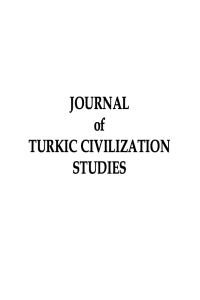Öz
Though the Soviet empire has long since collapsed and been dismantled, its countless legacies (technological, institutional, philosophical, and political, among others) remain powerfully real, alive and well, and they do so perhaps nowhere more than in the newly independent states of Muslim Central Asia and Uzbekistan in particular. An especially influential component of these legacies is the persistence and potency of a political culture of scientific atheism affecting the perceptions, attitudes, policies and practices of the old communist leaders of these states not only toward religion, especially Islam and Muslim religious activism, but toward freedom of thought and action in general. Another dimension of the same legacy has been the apparent expectation of the rise of militant Islamic movements against the successor state regimes as voiced by the media, most Russian and Western “experts” and Central Asia’s current power elites.
Anahtar Kelimeler
Kaynakça
- For a critique of “Sovietlogical Islamology” see Devin Deweese’s “Islam and the Legacy of Sovietology: A Review Essay on Yaacov Roi’s Islam in the Soviet Union” in Journal of Islamic Studies, 13(3):298-330. Also see Rumer 2002, 1993, and Critchlow 1989, and reports prepared for RAND Corporation by Cheryl Benard 2004, 2003; and for Policy Planning Unit of the Finish Ministry of Foreign Affairs, by Zeyno Baran, S. Fredrick Starr and Svante E. Cornell 2006 of the Central Asia-Caucasus Institute, Johns Hopkins University.
- 2 For a useful review of the reports on these events and the role of Uzbek government policies and practices, see Alisher Ilkhamov 2006, and Sarah Kendzior 2006.
Öz
Though the Soviet empire has long since collapsed and been dismantled, its countless legacies (technological, institutional, philosophical, and political, among others) remain powerfully real, alive and well, and they do so perhaps nowhere more than in the newly independent states of Muslim Central Asia and Uzbekistan in particular. An especially influential component of these legacies is the persistence and potency of a political culture of scientific atheism affecting the perceptions, attitudes, policies and practices of the old communist leaders of these states not only toward religion, especially Islam and Muslim religious activism, but toward freedom of thought and action in general. Another dimension of the same legacy has been the apparent expectation of the rise of militant Islamic movements against the successor state regimes as voiced by the media, most Russian and Western “experts” and Central Asia’s current power elites.
Anahtar Kelimeler
RECLAIMING ISLAM UZBEKISTAN SOVIET LEGACIES POST-SOVIET REALITIES
Kaynakça
- For a critique of “Sovietlogical Islamology” see Devin Deweese’s “Islam and the Legacy of Sovietology: A Review Essay on Yaacov Roi’s Islam in the Soviet Union” in Journal of Islamic Studies, 13(3):298-330. Also see Rumer 2002, 1993, and Critchlow 1989, and reports prepared for RAND Corporation by Cheryl Benard 2004, 2003; and for Policy Planning Unit of the Finish Ministry of Foreign Affairs, by Zeyno Baran, S. Fredrick Starr and Svante E. Cornell 2006 of the Central Asia-Caucasus Institute, Johns Hopkins University.
- 2 For a useful review of the reports on these events and the role of Uzbek government policies and practices, see Alisher Ilkhamov 2006, and Sarah Kendzior 2006.
Ayrıntılar
| Birincil Dil | İngilizce |
|---|---|
| Konular | Dini Araştırmalar (Diğer) |
| Bölüm | Araştırma Makalesi |
| Yazarlar | |
| Yayımlanma Tarihi | 30 Haziran 2006 |
| Yayımlandığı Sayı | Yıl 2006 Cilt: 2 Sayı: 1 |
Journal of Turkic Civilization Studies © 2022 by TUAUM is licensed under Attribution-NonCommercial 4.0 International
Journal of Turkic Civilization Studies by TUAUM is licensed under Attribution-NonCommercial 4.0 International


